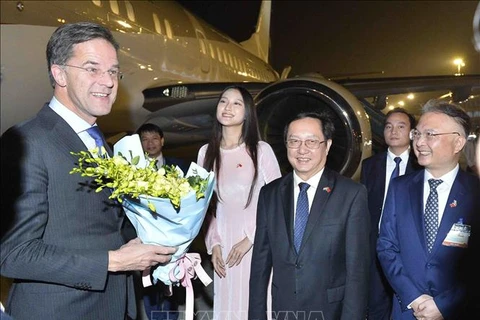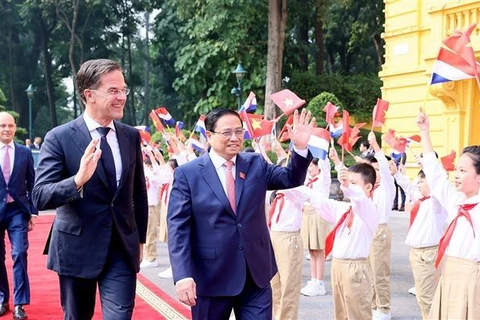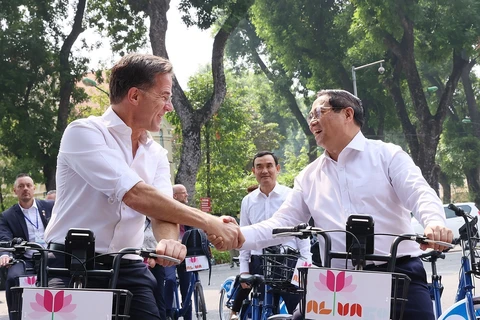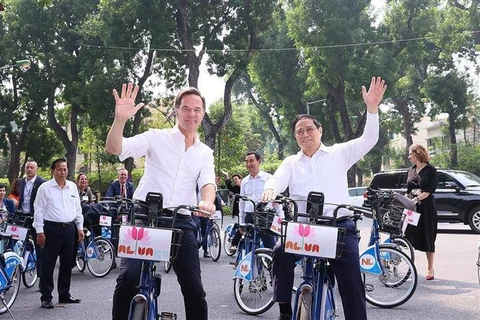 Prime Minister Pham Minh Chinh and Dutch Prime Minister Mark Rutte hold talks in Hanoi on November 2 (Photo: VNA)
Prime Minister Pham Minh Chinh and Dutch Prime Minister Mark Rutte hold talks in Hanoi on November 2 (Photo: VNA) Hanoi (VNA) – Prime Minister Pham Minh Chinh and Dutch Prime Minister Mark Rutte on November 2 agreed to strengthen political trust between the two countries through the exchange of high-level delegations, continue to effectively implement cooperation agreements, and consider the establishment of new mechanisms to deepen coordination.
At their talks in Hanoi during the Dutch PM’s ongoing visit to Vietnam, PM Chinh highly valued the sincere friendship and trustful partnership between Vietnam and the Netherlands, and affirmed that the two countries are determined to cooperate with each other for common self-reliance and sustainable development.
Rutte affirmed that Vietnam is a prioritised and important partner of the Netherlands in the Indo-Pacific region with a relationship starting more than 400 years ago since merchant vessels of the Netherlands docked at Hoi An port of Vietnam.
He showed his impression at the achievements Vietnam has made during the socio-economic recovery and development after COVID-19 pandemic and since his visit in 2019.
The two PMs spoke highly of the efforts in realising commitments and cooperation agreements since PM Chinh’s official visit to the Netherland in December 2022, with bustling delegation exchanges, the effective implementation of cooperation mechanisms, and the signing of new collaboration deals.
Affirming that economy-trade is an important pillar in the bilateral ties, they agreed to continue to fully and efficiently realise the EU-Vietnam Free Trade Agreement (EVFTA).
He suggested that the Netherlands support the European Commission (EC)’s removal of the “yellow card” against Vietnam’s seafood export, ratify the EU-Vietnam Investment Protection Agreement (EVIPA) soon, and encourage Dutch firms to invest more in Vietnam in the fields of high technology, seaport, and strategic infrastructure.
PM Rutte underlined that Dutch enterprises highly value Vietnam’s political stability and favourable investment-business environment. He agreed to speed up the ratification of the EVIPA, spoke highly of Vietnam’s efforts to promote sustainable fisheries development, and pledged to work with other EU members to support Vietnam in the field.
 Prime Minister Pham Minh Chinh and Dutch Prime Minister Mark Rutte witness the exchange of the Letter of Intent on cooperation in the exploration and sustainable exploitation of important minerals following their talks in Hanoi on November 2 (Photo: VNA)
Prime Minister Pham Minh Chinh and Dutch Prime Minister Mark Rutte witness the exchange of the Letter of Intent on cooperation in the exploration and sustainable exploitation of important minerals following their talks in Hanoi on November 2 (Photo: VNA) The two PMs concurred to continue expanding the framework of their strategic partnership in climate change response, water management, and sustainable agriculture, contributing to joint efforts in tackling global challenges. Particularly, the two sides will foster collaboration in the fields of offshore sand mining, green economic development, circular economy, climate change-resilient urban development, high-quality human resources training for climate change respsonse and water resources management, irrigation, and natural disaster prevention.
PM Chinh proposed that the Netherlands and G7 countries support Vietnam in technology, finance, human resources and institutional improvement to effectively implement the Just Energy Transition Partnership (JETP), while establishing a trilateral cooperation mechanism on agriculture, contributing to solving global food security problems.
PM Rutte affirmed that the Netherlands will assist Vietnam in implementing the Mekong Delta planning for the 2021-2030 period with a vision to 2050 as well as the plan on sustainable agricultural transition in the region, and in completing the legal framework regarding water management.
The two sides underlined that science-technology and innovation are breakthrough areas and agreed to optimise the potential for bilateral cooperation in high technology, electronic circuit and semiconductor device production, digital platform and telecommunications ecosystem building, digital transformation, and human resources development in these fields.
Vietnam and the Netherlands will expand cooperation in promising areas such as exploration and sustainable exploitation of important minerals, defence-security, customs, shipping, logistics, and people-to-people exchanges.
The Dutch PM described the Vietnamese community in his country as an important part of the host society, pledging to continue creating favourable conditions for the community to successfully integrate themselves there and act as a bridge for bilateral friendship.
At the talks, the two PM discussed a number of regional and international issues of shared interest. They agreed to continue to coordinate with and support each other at international and regional organisations, especially the UN and within the ASEAN-EU partnership framework.
PM Rutte lauded Vietnam’s external policy of independence, self-reliance, diversification and multilateralisation, and settlement of disputes through peaceful measures on the basis of international law.
PM Chinh congratulated the Netherlands on becoming a development partner of the ASEAN, and expressed his hope that the European country will engage more deeply in and giving more initiatives to the promotion of the ASEAN-EU relations in general and the ASEAN-Netherlands relationship in particular.
Regarding the East Sea issue, the two sides showed support for the ensuring of maritime and aviation security and safety as well as the peaceful settlement of disputes in line with international law, especially the 1982 UN Convention on the Law of the Sea (UNCLOS), and the negotiations on a substantial and effective Code of Conduct in the East Sea (COC) between ASEAN and China.
Following the talks, the two PMs witnessed the exchange of cooperation agreements among ministries, sectors and associations of the two countries over areas of sustainable exploration and exploitation of important minerals, customs, investment, and trade./.























